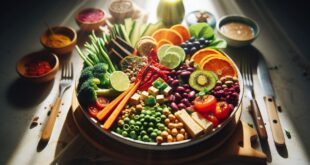For Czech athletes striving to achieve peak performance, nutrition plays a vital role. One key aspect of their diet is balancing carbohydrates and protein, especially for those following a plant-based lifestyle. A well-planned plant-based diet can provide all the necessary nutrients to fuel the body for rigorous training and competition, but getting the balance between carbs and protein right is essential for optimal energy levels and muscle recovery.
In this article, we will explore how to balance carbs and protein in a plant-based diet for Czech athletes, providing essential tips, meal planning advice, and answers to frequently asked questions.
Key Takeaways
- Carbs provide the energy needed for endurance activities, while protein supports muscle repair and recovery.
- A plant-based diet offers numerous sources of both macronutrients, but it requires careful planning.
- Czech athletes can effectively balance their diet by incorporating whole foods, legumes, and grains.
- Protein timing around workouts plays a key role in muscle repair and growth.
- Understanding the glycemic index and protein bioavailability can help optimize performance.
Why Balancing Carbs and Protein Matters for Athletes?
For athletes, a balance between carbohydrates and protein is crucial because these macronutrients serve different yet complementary functions. Carbohydrates are the body’s primary source of energy, particularly during high-intensity workouts and endurance sports. Protein, on the other hand, is vital for muscle growth, repair, and recovery after training sessions.

Carbs: The Energy Source for Endurance
Carbohydrates, especially complex ones, are broken down into glucose and stored as glycogen in muscles and the liver. During physical exertion, glycogen becomes the fuel source for prolonged exercise. Athletes need an ample supply of carbs to maintain endurance and performance, and this becomes even more important for those involved in sports like long-distance running, cycling, or team sports.
Protein: Building and Repairing Muscle Tissue
Protein is crucial for muscle repair and recovery. After intense physical activity, muscle fibers are broken down and need to be rebuilt. This rebuilding process requires amino acids, the building blocks of protein. Consuming sufficient protein ensures that athletes have the necessary components for this recovery phase, helping to reduce soreness and prevent injuries.
How to Balance Carbs and Protein in a Plant-Based Diet for Czech Athletes
A well-balanced plant-based diet can provide adequate amounts of both carbs and protein, but it requires careful attention. Below are strategies for Czech athletes to ensure they are meeting their nutritional needs:
1. Focus on Whole Grains for Carbs
Whole grains like oats, quinoa, brown rice, and barley are excellent sources of complex carbohydrates. These grains not only provide sustained energy but also contain essential vitamins, minerals, and fiber.
- Oats: Great for breakfast, oats provide a slow-release energy source and fiber.
- Quinoa: A complete protein, quinoa also offers a healthy dose of carbs.
- Brown Rice and Barley: Both are excellent sources of fiber and can be used in various dishes.
2. Incorporate Legumes for Protein
Legumes such as lentils, chickpeas, and beans are among the best plant-based sources of protein. These can be included in meals to support muscle repair and growth. Combining them with grains (such as rice and beans) creates a complete protein profile, ensuring all essential amino acids are present.
- Lentils: High in both protein and fiber, ideal for soups and stews.
- Chickpeas: Versatile for salads, hummus, or roasted snacks.
- Black Beans and Kidney Beans: Rich in protein, great for tacos or veggie burgers.
3. Healthy Fats for Overall Nutritional Balance
While focusing on carbs and protein, don’t forget about healthy fats. Sources such as avocados, nuts, seeds, and plant-based oils (like olive oil) are essential for overall health and can also contribute to sustained energy levels. Fat helps absorb fat-soluble vitamins, supports hormone production, and provides long-term energy for athletes.
- Nuts and Seeds: Almonds, walnuts, chia seeds, and flaxseeds.
- Avocados: A great source of healthy monounsaturated fats.
4. Protein Timing Around Workouts
For optimal muscle recovery and performance, Czech athletes should focus on protein timing. Consuming protein both before and after workouts can significantly enhance muscle recovery and growth.
- Pre-Workout Protein: Helps prevent muscle breakdown during exercise.
- Post-Workout Protein: Facilitates muscle repair and growth.
5. Using Protein Supplements
While whole foods should form the basis of a plant-based diet, some athletes may opt to use protein powders for convenience. Plant-based protein powders like pea, hemp, or brown rice protein can be effective for ensuring that protein needs are met, especially in the post-workout window.
Sample Plant-Based Meal Plan for Czech Athletes
| Meal | Carbs | Protein | Healthy Fats |
|---|---|---|---|
| Breakfast | Oats with berries and chia seeds | Tofu scramble or tempeh | Flaxseed oil drizzle |
| Lunch | Quinoa salad with mixed veggies | Chickpeas or black beans | Avocado |
| Snack | Whole grain crackers | Almonds or pumpkin seeds | Peanut butter |
| Dinner | Brown rice with lentils | Lentil stew or tempeh | Olive oil for cooking |
| Post-Workout | Sweet potato and veggies | Plant-based protein smoothie | Almond butter or tahini |
This meal plan offers a balanced ratio of carbs and protein to fuel an athlete’s training and recovery.
FAQs
How can Czech athletes ensure they are getting enough protein on a plant-based diet?
Czech athletes can ensure adequate protein intake by including a variety of plant-based protein sources, such as legumes, tofu, tempeh, edamame, quinoa, and nuts. Combining different sources of protein, such as grains and legumes, will provide all essential amino acids.
What are the best sources of carbohydrates for plant-based athletes?
Whole grains like quinoa, brown rice, oats, and barley are excellent sources of complex carbohydrates. Vegetables like sweet potatoes, squash, and root vegetables also provide high-quality carbs.
How can plant-based protein sources compare to animal-based protein for muscle recovery?
While animal-based proteins are complete, plant-based proteins can also provide all essential amino acids when combined properly. Foods like quinoa, soy, and legumes provide high-quality protein for muscle repair.
How important is protein timing for Czech athletes on a plant-based diet?
Protein timing is crucial for muscle recovery. Consuming protein within 30-60 minutes post-workout optimizes muscle repair. Pre-workout protein intake helps prevent muscle breakdown during exercise.
Conclusion
Balancing carbs and protein in a plant-based diet for Czech athletes doesn’t have to be challenging. With careful planning and the right food choices, athletes can meet their nutritional needs to fuel their training, enhance recovery, and improve performance. By focusing on whole grains, legumes, and healthy fats, and ensuring proper protein timing, Czech athletes can thrive on a plant-based diet. By incorporating these strategies into their meal planning, they can achieve both athletic success and long-term health.




